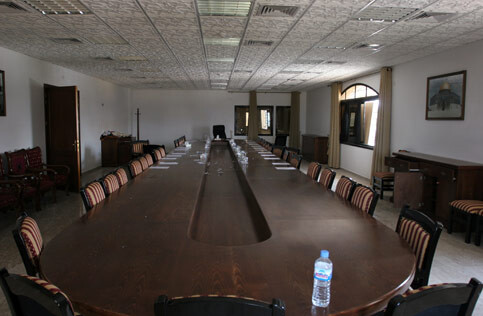The Electronic Intifada 16 June 2007

An empty meeting room of the Palestinian Authority in the Gaza Strip after Hamas gunmen took control of the presidential headquarters, 15 June 2007. (Wissam Nassar/MaanImages)
The Oslo endless-fruitless-negotiations peace process has created an ambiguous situation: the Palestinians are caught somewhere between state-building and liberation struggle without being or having either. As a result they bear the responsibilities of freedom without actually enjoying freedom. The world looks at them as if they were in a postcolonial stage while the colonialists are still around.
Additionally, the Oslo process has transformed the Palestinian revolutionary project into a corrupted comprador class that enjoys some benefits from the occupier. The victory of Hamas in the elections has caught this comprador class by surprise. Since then, the Fatah movement has refused to acknowledge its defeat, refused initially to join Hamas in a unity government, and waited eagerly to prove that Hamas has failed without initially giving it a chance to succeed.
The EU, United States, and Israel have boycotted the government and contributed their fair share to its prospected failure and to the Palestinian bloodshed. Hamas had refrained for more than two years prior to its elections from suicide attacks and has decided to participate in the electoral process created by Oslo. Ariel Sharon who rejected Oslo had his chance in power and was not boycotted by the world; Hamas was not given the same chance.
Today, Ha’aretz reports that Israel intends to release the Palestinian taxes money it withheld since Hamas came to power, because the Palestinian president, Mahmoud Abbas, has just decided to fire the government. This seems like another immediate reward and encouragement of one faction over the other to inflame the civil war. The media has reported on several occasions in the last two years about money, training, and weapons from the US and Israel to Fatah. All of it is intended to overthrow a legitimately elected government.

Palestinian President Mahmoud Abbas attends Friday prayers at his headquarters in the West Bank city of Ramallah, 15 June 2007. (Omar Rashidi/POOL/MaanImages)
The fighting in Gaza is shameful. In spite all of the above, Fatah and Hamas bear the main responsibility of the bloodshed. Oslo, it turns out, was a mistake. The reality of Palestinians killing each other over a meaningless authority (while the occupier is laughing down the road) is tragic. The Palestinian factions should have known better. They need to focus on unified strategies that will drive the colonizers out. This primary mission has been forgotten in the ebb and flow of mundane politics. The Palestinian Authority should be perceived as nothing more than a means to an end. If it is not helping the Palestinians to achieve self-determination then it should be dissolved altogether.
Oppressed peoples have known similar experiences. At the end of the 80s, a monthly average of 100 black South Africans were killed in black-on-black violence, and between 1990-1993 an average of 259 blacks per month were killed. These were the last days of the apartheid. One hopes that the Palestinian internal bloodshed will come to an end soon and with it the dawn of freedom.
Nimer Sultany is a Palestinian citizen of Israel and currently a doctoral candidate at Harvard Law School. He has worked as a human rights lawyer in the Association for Civil Rights in Israel and as the head of the political monitoring project at Mada al-Carmel (the Arab center for applied social research).
This commentary was originally published by The Guardian’s Comment is Free and is republished with the author’s permission.
Related Links





